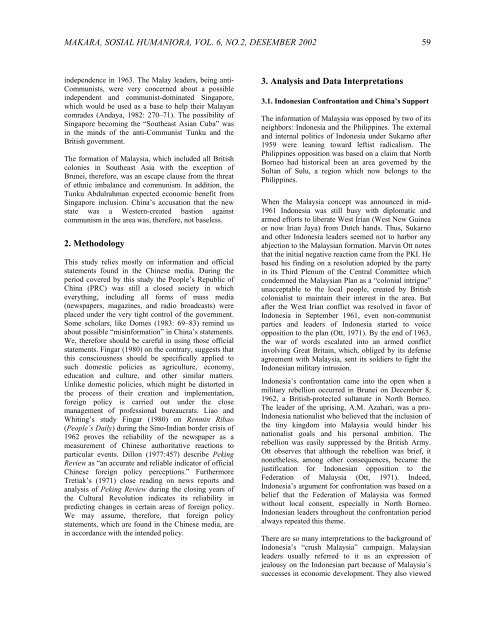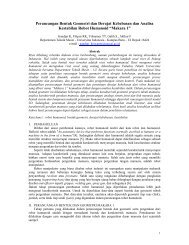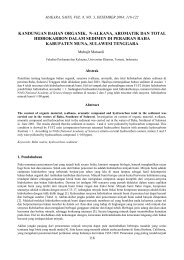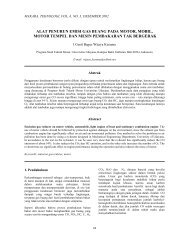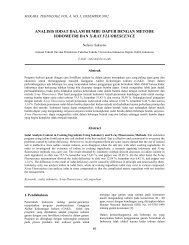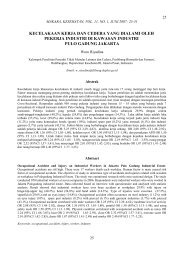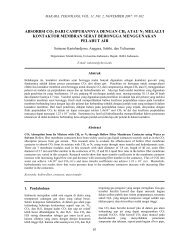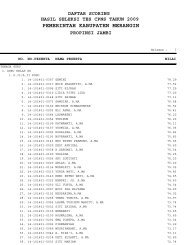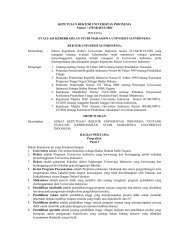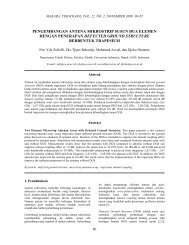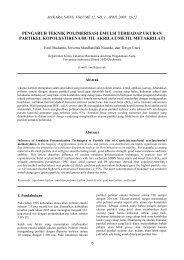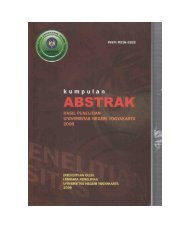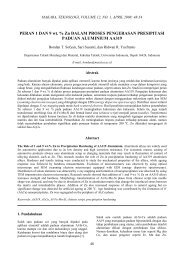“crush malaysia” campaign - Repository UI - Universitas Indonesia
“crush malaysia” campaign - Repository UI - Universitas Indonesia
“crush malaysia” campaign - Repository UI - Universitas Indonesia
You also want an ePaper? Increase the reach of your titles
YUMPU automatically turns print PDFs into web optimized ePapers that Google loves.
MAKARA, SOSIAL HUMANIORA, VOL. 6, NO.2, DESEMBER 2002 59<br />
independence in 1963. The Malay leaders, being anti-<br />
Communists, were very concerned about a possible<br />
independent and communist-dominated Singapore,<br />
which would be used as a base to help their Malayan<br />
comrades (Andaya, 1982: 270–71). The possibility of<br />
Singapore becoming the “Southeast Asian Cuba” was<br />
in the minds of the anti-Communist Tunku and the<br />
British government.<br />
The formation of Malaysia, which included all British<br />
colonies in Southeast Asia with the exception of<br />
Brunei, therefore, was an escape clause from the threat<br />
of ethnic imbalance and communism. In addition, the<br />
Tunku Abdulrahman expected economic benefit from<br />
Singapore inclusion. China’s accusation that the new<br />
state was a Western-created bastion against<br />
communism in the area was, therefore, not baseless.<br />
2. Methodology<br />
This study relies mostly on information and official<br />
statements found in the Chinese media. During the<br />
period covered by this study the People’s Republic of<br />
China (PRC) was still a closed society in which<br />
everything, including all forms of mass media<br />
(newspapers, magazines, and radio broadcasts) were<br />
placed under the very tight control of the government.<br />
Some scholars, like Domes (1983: 69–83) remind us<br />
about possible “misinformation” in China’s statements.<br />
We, therefore should be careful in using those official<br />
statements. Fingar (1980) on the contrary, suggests that<br />
this consciousness should be specifically applied to<br />
such domestic policies as agriculture, economy,<br />
education and culture, and other similar matters.<br />
Unlike domestic policies, which might be distorted in<br />
the process of their creation and implementation,<br />
foreign policy is carried out under the close<br />
management of professional bureaucrats. Liao and<br />
Whiting’s study Fingar (1980) on Renmin Ribao<br />
(People’s Daily) during the Sino-Indian border crisis of<br />
1962 proves the reliability of the newspaper as a<br />
measurement of Chinese authoritative reactions to<br />
particular events. Dillon (1977:457) describe Peking<br />
Review as “an accurate and reliable indicator of official<br />
Chinese foreign policy perceptions.” Furthermore<br />
Tretiak’s (1971) close reading on news reports and<br />
analysis of Peking Review during the closing years of<br />
the Cultural Revolution indicates its reliability in<br />
predicting changes in certain areas of foreign policy.<br />
We may assume, therefore, that foreign policy<br />
statements, which are found in the Chinese media, are<br />
in accordance with the intended policy.<br />
3. Analysis and Data Interpretations<br />
3.1. <strong>Indonesia</strong>n Confrontation and China’s Support<br />
The information of Malaysia was opposed by two of its<br />
neighbors: <strong>Indonesia</strong> and the Philippines. The external<br />
and internal politics of <strong>Indonesia</strong> under Sukarno after<br />
1959 were leaning toward leftist radicalism. The<br />
Philippines opposition was based on a claim that North<br />
Borneo had historical been an area governed by the<br />
Sultan of Sulu, a region which now belongs to the<br />
Philippines.<br />
When the Malaysia concept was announced in mid-<br />
1961 <strong>Indonesia</strong> was still busy with diplomatic and<br />
armed efforts to liberate West Irian (West New Guinea<br />
or now Irian Jaya) from Dutch hands. Thus, Sukarno<br />
and other <strong>Indonesia</strong> leaders seemed not to harbor any<br />
abjection to the Malaysian formation. Marvin Ott notes<br />
that the initial negative reaction came from the PKI. He<br />
based his finding on a resolution adopted by the party<br />
in its Third Plenum of the Central Committee which<br />
condemned the Malaysian Plan as a “colonial intrigue”<br />
unacceptable to the local people, created by British<br />
colonialist to maintain their interest in the area. But<br />
after the West Irian conflict was resolved in favor of<br />
<strong>Indonesia</strong> in September 1961, even non-communist<br />
parties and leaders of <strong>Indonesia</strong> started to voice<br />
opposition to the plan (Ott, 1971). By the end of 1963,<br />
the war of words escalated into an armed conflict<br />
involving Great Britain, which, obliged by its defense<br />
agreement with Malaysia, sent its soldiers to fight the<br />
<strong>Indonesia</strong>n military intrusion.<br />
<strong>Indonesia</strong>’s confrontation came into the open when a<br />
military rebellion occurred in Brunei on December 8,<br />
1962, a British-protected sultanate in North Borneo.<br />
The leader of the uprising, A.M. Azahari, was a pro-<br />
<strong>Indonesia</strong> nationalist who believed that the inclusion of<br />
the tiny kingdom into Malaysia would hinder his<br />
nationalist goals and his personal ambition. The<br />
rebellion was easily suppressed by the British Army.<br />
Ott observes that although the rebellion was brief, it<br />
nonetheless, among other consequences, became the<br />
justification for <strong>Indonesia</strong>n opposition to the<br />
Federation of Malaysia (Ott, 1971). Indeed,<br />
<strong>Indonesia</strong>’s argument for confrontation was based on a<br />
belief that the Federation of Malaysia was formed<br />
without local consent, especially in North Borneo.<br />
<strong>Indonesia</strong>n leaders throughout the confrontation period<br />
always repeated this theme.<br />
There are so many interpretations to the background of<br />
<strong>Indonesia</strong>’s <strong>“crush</strong> Malaysia” <strong>campaign</strong>. Malaysian<br />
leaders usually referred to it as an expression of<br />
jealousy on the <strong>Indonesia</strong>n part because of Malaysia’s<br />
successes in economic development. They also viewed


